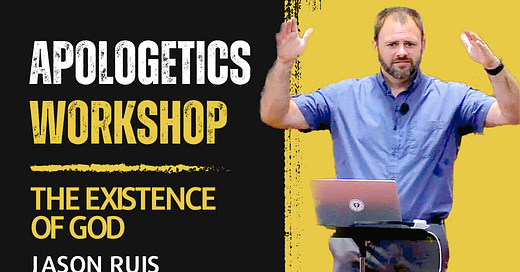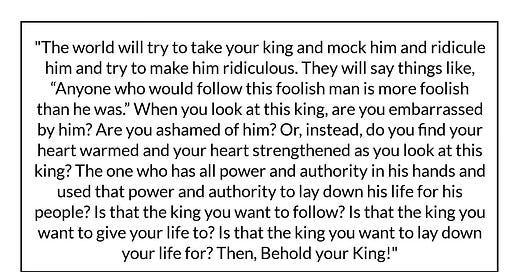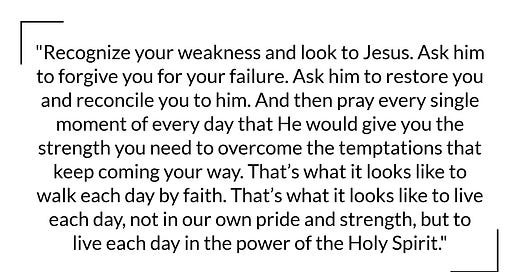
The One Who Loves Money
[Read Ecclesiastes 5:8-6:9]
I learned a lot about money as I ran my dock business over the years. Yet, the biggest lessons I learned about money didn’t come from the business itself, it came from the customers.
One job stands out as a perfect example. It was a fairly basic dock and boat lift to install. I had done the job before and things went smoothly. I had a hard time lining up help for the day, so I decided to do the job on my own. I was fairly confident I could get it done.
When I showed up at the cabin the owner was there and his friend. In order to understand the situation, it’s important to know that the majority of my dock clients were wealthy. The typical joe-schmo isn’t going to hire someone for this job (I would never hire someone to do this job). So, as I arrived at the cabin, I saw my client and his friend standing there. My client was dressed very “business casual.” Take all of the stereotypes that pop into your mind about a wealthy person spending the weekend at his lake place and you most likely have an accurate picture of this customer. His friend, on the other hand, was standing there in a pair of jeans and a sleeveless flannel shirt. It was a stark contrast.
As I began installing the dock and lift, things were going smoothly. Yet the owner’s friend eventually came out in a set of waders to help with the job. He said he couldn’t sit there and watch me do it by myself. So, here’s the picture: The owner of the place is sitting in his backyard sipping on a mixed drink, watching me and his friend install his dock and boat lift.
I’ll be honest. I wasn’t impressed with the owner. I remember muttering under my breath—or at least in my mind—things about how much I appreciate the average blue-collar worker (like his friend who was helping me in the water) rather than the lazy white-collar worker.
However, my stereotype changed after I finished the job. As I was packing up my equipment, the owner came over to pay me and have a conversation. He said, “Do you know who you were working with?” He went on to brag about his friend—the one who worked with me in the water the whole time wearing a sleeveless flannel shirt. He was the owner of a multi-million dollar company. He owned a multi-million dollar mansion—used as a cabin—in northern Minnesota. He rubbed shoulders with many of the rich and powerful people throughout Minnesota. As the owner told me stories of his friend, every word dripped with awe and envy. You could tell he wanted to be just like his friend.
That’s when it hit me. The difference between these two men was not a blue-collar/white-collar thing. The difference wasn’t about one being rich and the other being poor. The difference was the love of money. That was the root of the issue. The man in the water with me had more money than any of us could ever dream of, but he didn’t love it. The man who sat on the shore drinking cocktails, watching us work, actually didn’t have much money—but he loved money. He wanted everyone to think he had money. Everything he did and pursued was about money. He liked the image of having money. He liked hanging around people who had money. I saw this over and over and over again. The people who treated me like dirt—like an insignificant servant boy—were the ones who didn’t have much money BUT LOVED IT and wanted everyone else to think they had money. Yet, I had other customers who were extremely wealthy and didn’t love their money—they were the most likable, salt-of-the-earth people I dealt with.
That’s what our passage is teaching us this morning. The author says, “Whoever loves money never has enough; whoever loves wealth is never satisfied with their income. This too is meaningless.” (Ecclesiastes 5:10, NIV). If you love money, you will never have enough and you will never be satisfied. It’s a meaningless pursuit. Yet, there are many who are teaching our teenagers and young adults to pursue it. As they think about what job they want to pursue after high school, MANY are pursuing a job purely based on income. What job is going to make me the most money? People tell them that they don’t have to LOVE their job, it only has to make them enough money to do what they love to do. Yet, as you enter into this pursuit, you will eventually realize that you never have ENOUGH. You will never be satisfied with what you’re making. You will always find things that could be improved, make better, more enjoyable...if only you made a little more money.
And besides the author reminds us: “As goods increase, so do those who consume them. And what benefit are they to the owners except to feast their eyes on them?” (Ecclesiastes 5:11, NIV).The more we make, the more we spend. We’ve all been there right? We’ve been working hard for a long time and finally get the raise we’ve been wanting. Yet, after a few months, nothing seems to have changed. You’re still living paycheck to paycheck. You still feel strapped for cash. Why? Because the more money you make the more money you spend.
The author gives us another metaphor: “Everyone’s toil is for their mouth, yet their appetite is never satisfied.” (Ecclesiastes 6:7, NIV). You keep putting food in your mouth, but do you ever have to stop eating because you’re finally full? No. It keeps running through you. This may be a crass metaphor, but I’m going to use it anyway. It’s like a septic line. A raise is like changing from a 3” to a 4” pipe. Yep, more “stuff” is able to come in, but more “stuff” is going to keep flowing out. It doesn’t matter if you get a raise to a 6” or a 12” pipe. It’s not about increasing the size of the pipe. That’s a meaningless pursuit and you will never be satisfied.
And because this is a meaningless pursuit, and because people are never satisfied in this pursuit, there is oppression and injustice. “If you see the poor oppressed in a district, and justice and rights denied, do not be surprised at such things; for one official is eyed by a higher one, and over them both are others higher still.” (Ecclesiastes 5:8, NIV). Since no one is ever satisfied with the pursuit of money, yet they continue to pursue meaninglessness, trying to convince themselves that they can make enough money to find meaning and satisfaction—there’s injustice and oppression. They don’t care who they step on to find meaning and satisfaction. They need to keep climbing the ladder. Yet, when they finally get a step higher up the ladder, they realize that someone else is still higher than them. So they pursue the next rung on the ladder only to find another higher than them. So, they keep going and going and going leaving a trail of dead bodies in their wake. When a society is driven by the love of power and the love of money—there will ALWAYS be oppression and injustice.
So, the author tells us, we shouldn’t be surprised. This is always the way things go when we reject God. When we reject God as the ultimate rule and authority in the world, then the seat is “up for grabs” and everyone is fighting for that position. As everyone fights for that position, they don’t care about who they step on or how they get there. And, when they get there—thinking they are the highest authority in the world—there is no way to check their power. So, do whatever they want to do and there’s more oppression and injustice. The pursuit of wealth and power never satisfy because there’s never enough and, as people pursue these things, they leave a wake of bodies in their path.
Not only do they end up stepping on other people in their path, they end up ruining their own life. The Author says, “I have seen a grievous evil under the sun: wealth hoarded to the harm of its owners, or wealth lost through some misfortune, so that when they have children there is nothing left for them to inherit. Everyone comes naked from their mother’s womb, and as everyone comes, so they depart. They take nothing from their toil that they can carry in their hands. This too is a grievous evil: As everyone comes, so they depart, and what do they gain, since they toil for the wind? All their days they eat in darkness, with great frustration, affliction and anger.” (Ecclesiastes 5:13–17, NIV). In response to the sewer pipe metaphor, some may say we need to make sure we’re keeping the money so that it doesn’t just disappear. We need to use a septic tank to store all of the “stuff” flowing through the pipe. Yet, it’s still just “stuff” and it wasn’t designed to be stored forever.
Here’s this story of a man who hoarded all his money—like Ebenezer Scrooge—to his own harm. He was a tight-wad. He saved up everything he had and stored it away. Yet, something happened. The stock-market crashed. A pandemic hit. He lost everything. What was the point? He made himself—and his family—miserable for years, refusing to use the money God had given him. The author says, “All their days they eat in darkness, with great frustration, affliction and anger.” (Ecclesiastes 5:17, NIV). They hated life in the pursuit of storing up wealth and still died with nothing—just like the rest of us. We will all leave the world the same way we entered—with NOTHING.
What about the man who has lots of money and spends it for his pleasure? He’s better off, right? At least he’s not Ebenezer Scrooge! “I have seen another evil under the sun, and it weighs heavily on mankind: God gives some people wealth, possessions and honor, so that they lack nothing their hearts desire, but God does not grant them the ability to enjoy them, and strangers enjoy them instead. This is meaningless, a grievous evil. A man may have a hundred children and live many years; yet no matter how long he lives, if he cannot enjoy his prosperity and does not receive proper burial, I say that a stillborn child is better off than he.” (Ecclesiastes 6:1–3, NIV). Wow. God gives some people wealth and possessions and honor. He gives it to them so that they lack nothing their hearts desire. Yet, the one thing God doesn’t give them is the ability to enjoy them. They can have anything but they still enjoy nothing. They can buy anything they want, yet still never enjoy any of it.
The author says that a stillborn child is better off than this person. Those are harsh words. He says that at least the stillborn child has rest. But this person, always working, always spending, always trying to keep up with the Jones’ never gets rest. Always working, always spending, NEVER SATISFIED, NEVER ENJOYING.
So, what’s the answer? If you’ve been paying attention throughout this series, you should already be expecting the answer: “This is what I have observed to be good: that it is appropriate for a person to eat, to drink and to find satisfaction in their toilsome labor under the sun during the few days of life God has given them—for this is their lot.” (Ecclesiastes 5:18, NIV). Enjoy the gifts God has given you. Be satisfied with what God has given you. Enjoy and be satisfied with the job he’s given you. Enjoy and be satisfied with the food and clothing God has given you. Enjoy and be satisfied with the house God has given you. Rather than always searching for something more, something better, REST in what you have right now. Understand that this is the life God has given you. So, trust Him and enjoy it and be satisfied.
But what if you’re not satisfied? What if you’re struggling to REST in the life God has given you? Seek God and ask for His help: “Moreover, when God gives someone wealth and possessions, and the ability to enjoy them, to accept their lot and be happy in their toil—this is a gift of God.” (Ecclesiastes 5:19, NIV). It’s God who gives the wealth and possessions. It’s also God who gives us the ability to enjoy the wealth and possessions we have. It’s God who gives us the ability to accept our lot in life and to enjoy the work he’s given us. This is the gift of God! So, if we are living unsatisfied and unjoyfully in our current situation, we need to get on our knees, seek forgiveness, repent, and ask for God—through the Spirit—to give us this gift of satisfaction and joy in our current situation. He is the only one who can give it to us.
Not only should we ask for this contentment and joy, but we also need to remember God’s promises in Jesus Christ. We need to remember Jesus’ words to the disciples: “And surely I am with you always, to the very end of the age.”” (Matthew 28:20, NIV). Then the words of Hebrews: “Keep your lives free from the love of money and be content with what you have, because God has said, “Never will I leave you; never will I forsake you.”” (Hebrews 13:5, NIV). We can be content with what we have—however little it may be—BECAUSE Jesus Christ has promised that we will ALWAYS have Him—He will always be with us. He is not fleeting like money and possessions and power. They come and go all the time. But Christ is ALWAYS here with us—providing for us and protecting us. He is enough. Let us stop falling into the love of money and be fully satisfied and content in Christ—loving HIM with all our heart, soul, mind, and strength.









